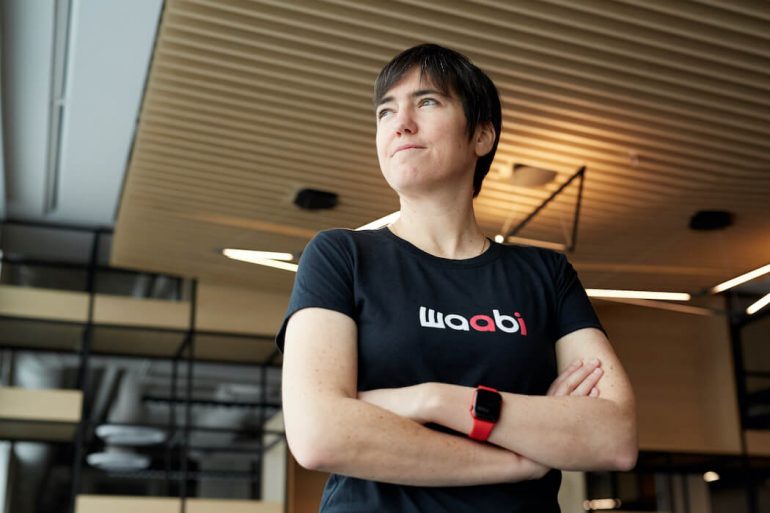Artificial intelligence and self-driving car expert Raquel Urtasun says the next generation of autonomous vehicle technology is here.
Eight months after coming out of stealth mode with her company, and securing $100 million CAD in initial capital, Urtasun has unveiled the capabilities of Waabi’s technology.
Urtasun and her team have developed an artificial intelligence brain, which it calls Waabi Driver, and a simulator, called Waabi World, meant to make the testing of self-driving cars safer, easier, and faster.
Waabi’s pitch is that its technology “is the most scalable, highest-fidelity closed-loop simulator to ever exist.”
Waabi World is a closed-loop simulator that allows for the testing of self-driving car technology on virtual roads rather than real, public ones. The Waabi simulator mirrors the real world and allows the artificial intelligence powering self-driving cars (Waabi Driver) to learn in an immersive and reactive environment.
While virtual testing environments for self-driving cars already exist, Waabi’s pitch is that its technology “is the most scalable, highest-fidelity closed-loop simulator to ever exist and the key to unlocking the potential of self-driving technology.”
“[It] automatically teaches the self-driving brain to learn to drive on its own,” explained Urtasun. “So basically, it can perform … skills tests, it can train the system, and all without human intervention. We like to call this the automated school for self-driving vehicles.”
When it comes to testing and training self-driving vehicles there are many ways to do so: on public roads (where allowed), closed tracks, and through various types of virtual simulators.
The use of simulators has become increasingly popular in recent years. Global automation company Siemens, for example, created its own closed-loop simulation in 2019, and spun out an autonomous vehicle testing startup, Simulytic.
RELATED: Raquel Urtasun launches new self-driving startup Waabi with $100 million CAD from top investors
So what makes Waabi’s tech stand out? Urtasun says it’s the complexity of Waabi’s system.
“There is nothing out there that is closely similar or that has the ingredients that Waabi World has,” Urtasun told BetaKit in an interview. “It’s really this big step change as it relates to simulation … it’s definitely that next generation in that it’s going to make a big splash in the industry.”
It’s a bold claim, but one that is backed by Urtasun’s own expertise and experience.
Waabi’s founder is considered one of the world’s leading experts in artificial intelligence for self-driving cars. She has served as a Uber self-driving car lead, as a computer science professor at the University of Toronto (known for its AI), and did her postdoc at the Massachusetts Institute of Technology (MIT) and the University of California, Berkeley. Urtasun is also a co-founder of Toronto’s Vector Institute.
It’s clear that investors believe in Urtasun’s tech as well. Her backers not only include institutional firms like Khosla Ventures, but Uber and Aurora (which acquired Uber ATG), as well as AI experts including Geoffrey Hinton, Fei-Fei Li, Pieter Abbeel, and Sanja Fidler.
As self-driving technology becomes more prevalent – whether it’s Tesla cars, truck fleets or even racing – the need to test the new-fangled technology driving these cars (literally) is of utmost importance. But it comes with both challenges and risks: human lives, changes in weather, or testing highly autonomous vehicles on empty roads (which is not ideal from a data standpoint).
While consumers are used to seeing Tesla’s on public roads, those vehicles are not fully autonomous. And in order for vehicles to reach full autonomy, much more work is needed; vehicles need to learn to predict and adapt to countless types of situations. Just recently, Tesla recalled nearly 54,000 vehicles because their software allowed them to roll through stop signs without coming to a complete halt.
It is estimated that autonomous vehicles would have to be driven hundreds of millions of miles, and sometimes hundreds of billions of miles to demonstrate their reliability, especially when it comes to fatalities and injuries.
Doing so is not only time-consuming, it’s expensive.
“The vast diversity of experiences that a self-driving vehicle needs to experience in order to be able to handle all those situations, it’s actually not possible,” argued Urtasun. “You would need to drive for 1,000s of years with 1,000s of vehicles to really experience that. So we needed a radical new approach, and this is what this Waabi World simulator is; the ability to really expose the self-driving vehicles to all that variety of the real world at once without requiring … [the] very expensive and unnecessary way of driving dummy miles on the road.”
Waabi says its simulator has four main capabilities that make it the next generation of self-driving testing:
- building digital twins of the world from data, “automatically and at scale;”
- performing near-real-time high-fidelity sensor simulation that enables testing of the entire software stack in an immersive and reactive manner;
- creating scenarios to stress-test the Waabi Driver;
- teaching the Waabi Driver to learn from its mistakes and master the skills of driving without human intervention.
Waabi’s initial focus for its technology remains long-haul trucks.
The market is a competitive one that includes Waymo (formerly of Google), Daimler, and Aurora, which bought Uber ATG (which Urtasun was part of). Roughly 90 percent of United States manufacturers believe that fully autonomous trucks could, when mainstreamed, save up to 25 percent of their total trucking costs, according to a report from PwC. The report estimates autonomous, long-haul trucking could save manufacturers nearly 30 percent in total transportation costs through 2040, assuming aggressive adoption of autonomous trucking.
Urtasun called long haul trucking the first use case of Waabi’s tech and claimed the technology revealed today is just the first example of what her company can do.
“Our driver can actually automatically learn as it experiences, [and] it’s really the next level in terms of really mimicking human learning on the self-driving vehicle,” said Urtasun. “All of these capabilities together is the first time that such a thing exists.”
Images courtesy Waabi.


